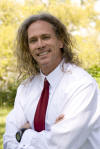
About 29 years ago, as a teenager, while roaming the Birmingham
Public Library, I picked up a worn copy of Victor Frankl's book about man's
search for meaning. I vividly remember where I was standing, think I could
almost go to the spot on the shelf where I found the book; I think the memory
lives clearly because as I scanned through the book, I became haunted with the
images that came from its pages and moved by the strength of which it testified.
I sat down, read more, took the book home, and never forgot the lesson.
When I worked as a janitor in high school at a local gym, I tried to find
meaning by framing my work as helping provide a wholesome environment for
children. When I worked as a cook at Hardee's, I was helping keep families
together by providing a convenient and affordable place to escape and relax.
When I worked alone as a chemist on army contracts, I was helping preserve
freedom. When I worked as an ER physician, the value of saving lives was plain
but then the challenge was to find meaning in the suffering around me.
These examples (from my work life) show what I strove for; but the practical,
every-day accomplishment of finding meaning in the pain, drudgery, and
short-term injustice that swirls around me and everyone I know has not always
been a task at which I've been successful. Sometimes, I left the gym nasty and
tired and just angry at how inconsiderate people can be. Sometimes I left the ER
angry and confused that innocent people came to me in pain and disease at no
fault of their own: how do you hold responsible a child molested, a young mother
killed by a drunk driver, the crying child with sickle cell disease, the gasping
child with cystic fibrosis?
You don't hold them responsible. And as you wade through the pain of the ER
working with nurses and technicians with their own problems, sometimes it feels
as if the world is thick with pain and thin with meaning.
In looking for meaning in suffering, I've found some help in Boethius' book
"Consolation of Philosophy," in William James' "Pragmatism," in Oswald Chambers'
"The Christian Disciplines," in the scriptures of the Holy Bible and the Bagavad
Gita as well as in Frankl's writings.
I write this reverently with the awareness that I'm immature in these
matters--I've looked into the face of a quadriplegic man, bed bound for over 20
years, and heard him talk eloquently about how his accident was good fortune
because it brought him closer to GOD; I don't know if I could do that. I've had
to tell the mother that her child didn't live and watched her accept the news
with strength and peace. I've seen this and more and so know that some do find
meaning in situations heavy with pain.
A big part of staying healthy involves finding a peaceful center of meaning from which to work. Abe Lincoln said that if he had 4 hours to chop down a tree, he would spend 3 hours sharpening his ax and one hour chopping the tree. By using a morning routine to find a peaceful healthy center from which to work, and then by focusing on just two or three things that seem important when leaving that place of quiet to go into the day, the less important becomes less distracting and what work you do gains more meaning. Part of the idea behind sharpening the saw is to review why you want to chop down the tree (and the two or three trees most important for you to chop)--knowing gives more attention to the sharpening and more force to the swing of the ax.
No one can do and be everything. Now, my two things are to be a good father and help people find better health. When I was a teenager, working as a cook, my two things were to be a good student and to help people have a peaceful place to have a good meal. Naming just two or three things brings more resolve to resolution and more attention and meaning to efforts to be healthy.
What are your two or three things.